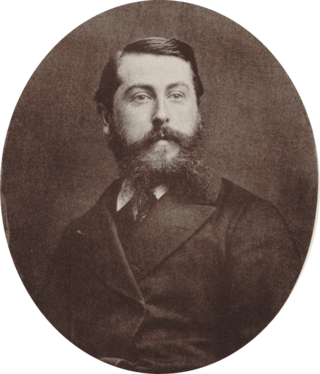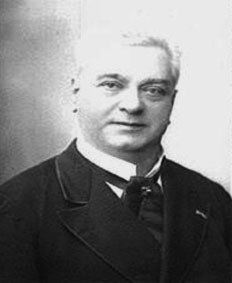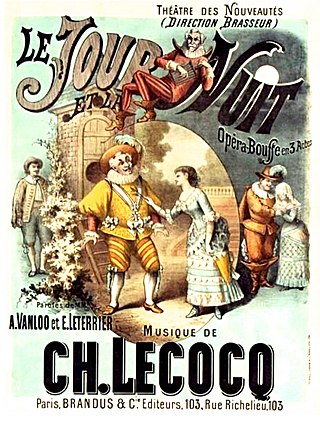Juliette Darcourt | |
|---|---|
 Juliette Darcourt, photographed by Nadar in 1885 | |
| Other names | Juliette d'Harcourt |
| Occupation(s) | Actress, singer |
Juliette Darcourt also seen as Juliette d'Harcourt, was a French actress and singer on the Paris stage.
Juliette Darcourt | |
|---|---|
 Juliette Darcourt, photographed by Nadar in 1885 | |
| Other names | Juliette d'Harcourt |
| Occupation(s) | Actress, singer |
Juliette Darcourt also seen as Juliette d'Harcourt, was a French actress and singer on the Paris stage.
In 1878, Darcourt was a young beauty in the company of Coco, at the opening of Jules Brasseur's Théâtre des Nouveautés in Paris. [1] She appeared in operettas, often with the Opéra-Comique, including Le Premier Baiser (1883), [2] Vie Parisienne (1883), [3] Le Château de Tire-Larigot (1884), La Nuits aux soufflets (1884), [4] L'Oiseau bleu (1884), [5] La Vie mondaine (1885), Le Petit Chaperon rouge (1885), L'amour Mouillé (1887), [6] Le Puits qui parle (1888), Juanita (1891), [7] and Le Commandant Laripète (1892). [8]
In 1899 Darcourt was in the casts of Le Faubourg and Les Amants Legitimes in Paris. [9] [10] She was in Sylvie, ou La Curieuse d'Amour in 1900. [11] In 1901 she was in the cast of Paul Hervieu's play, The Trail of the Torch, when it debuted at the Théatre du Vaudeville. [12] In 1903, she was described as "particularly good" in a production of L'Adversaire by Alfred Capus. [13] She was considered a fashionable woman; reports and photographs of her gowns were published internationally. [14]
Darcourt married the actor Albert Brasseur (Jules's son), who died in 1932. [15]

Clément Philibert Léo Delibes was a French Romantic composer, best known for his ballets and operas. His works include the ballets Coppélia (1870) and Sylvia (1876) and the opera Lakmé (1883), which includes the well-known "Flower Duet".

André Charles Prosper Messager was a French composer, organist, pianist and conductor. His compositions include eight ballets and thirty opéras comiques, opérettes and other stage works, among which his ballet Les Deux Pigeons (1886) and opéra comiqueVéronique (1898) have had lasting success; Les p'tites Michu (1897) and Monsieur Beaucaire (1919) were also popular internationally.

Achille Edmond Audran was a French composer best known for several internationally successful comic operas and operettas.

Paul Armand Silvestre was a 19th-century French poet and conteur born in Paris.

Alexandre Charles Lecocq was a French composer, known for his opérettes and opéras comiques. He became the most prominent successor to Jacques Offenbach in this sphere, and enjoyed considerable success in the 1870s and early 1880s, before the changing musical fashions of the late 19th century made his style of composition less popular. His few serious works include the opera Plutus (1886), which was not a success, and the ballet Le cygne (1899). His only piece to survive in the regular modern operatic repertory is his 1872 opéra comique La fille de Madame Angot. Others of his more than forty stage works receive occasional revivals.

Le droit d'aînesse is an opéra bouffe, a form of operetta, in three acts by Francis Chassaigne with a French libretto by Eugène Leterrier and Albert Vanloo. It premiered in Paris in 1883. An English-language version titled Falka, with a libretto translated and adapted by Henry Brougham Farnie, was successfully premiered in London later that year followed by productions throughout the English-speaking world.

Comte Émile de Najac was a French librettist. He was a prolific writer during the Second Empire and early part of the Third Republic, supplying plays and opéra comique librettos, many in one act.
Louis Beydts was a French composer, music critic and theatre director, born 29 June 1895 in Bordeaux and died on 15 August 1953 at Caudéran in Gironde.

Marguerite Ugalde (1862–1940) was a French mezzo-soprano. She was the daughter of the singer and theatre manager Delphine Ugalde.

Jean-François-Philibert Berthelier was a French actor and singer, who performed many light tenor roles in opéra-comique and opéra-bouffe.

Henri Charles Antoine Gaston Serpette was a French composer, best known for his operettas. After winning the prestigious Prix de Rome as a student at the Paris Conservatoire, he was expected to pursue a career in serious music. Instead, he turned to operetta, writing more than twenty full-length pieces between 1874 and 1900. He accepted some conducting work and also served as a critic and journalist for a number of French newspapers and magazines.

The Théâtre des Nouveautés is a Parisian theatre built in 1921 and located at 24 boulevard Poissonnière. The name was also used by several earlier Parisian theatre companies and their buildings, beginning in 1827.

Francis Chassaigne was a Belgian-born French composer of operettas, songs, and numerous pieces of dance music for piano. The English-language versions of his operettas, Le droit d'aînesse (1883) and Les noces improvisées (1886) became very popular in Britain and the United States. Chassaigne was married to the Swiss-born operetta singer Louise Roland.

The Salle de la Bourse was a Parisian theatre located on the rue Vivienne in the 2nd arrondissement, across from the Paris Bourse, hence the name. It was successively the home of the Théâtre des Nouveautés (1827–1832), the Opéra-Comique (1832–1840), and the Théâtre du Vaudeville (1840–1869). The theatre was demolished in 1869.

Albert Abraham Wolff, was a French writer, dramatist, journalist, and art critic who was born in Germany.

Jules Brasseur was a French actor and singer, born 1829 in Paris and died in the same city in 1890, who achieved considerable popular success in Paris and around France in the second half of the 19th century.

Théodore Lajarte was a French musicologist, librarian, and composer.

Le jour et la nuit is an opéra-bouffe with a libretto by Albert Vanloo and Eugène Leterrier and music by Charles Lecocq. It was first performed in Paris in 1881, ran for 193 performances and was subsequently staged at other theatres in Europe, North America and Australia. It has not remained in the regular international operatic repertoire.

Ernest Louis Antoine Grenet called Ernest Grenet-Dancourt was a French playwright, poet and songwriter.

Albert Brasseur was the stage name of the French actor Jules Cyrille Albert Dumont.